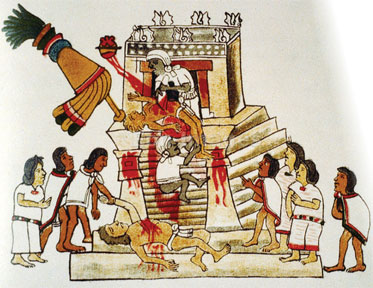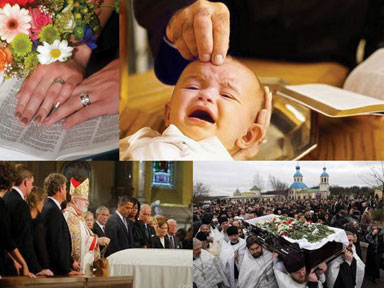Richard Dawkins Religious belief as a 'meme'
By Madeleine WIGHTMAN
|

Aztec priest performing the sacrificial offering of a living
human s heart to
the war god Huitzilopochtli. From the Codex Megliabecchi.
|
Prof.Richard Dawkins uses the term 'Meme' to refer to any cultural
entity that an observer might consider a replicator. He hypothesises
that one could view many cultural entities as replicators, and pointed
to melodies, fashions and learned skills as examples. Memes replicate
through exposure to humans, who have evolved as efficient copiers of
information and behaviour.
Since humans do not always copy memes perfectly, and because they may
refine, combine or otherwise modify them with other memes to create new
memes, they can change over time. Prof. Dawkins likened the process by
which memes survive and change through the evolution of culture to the
natural selection of genes in biological evolution.
Memes, analogously to genes, vary in their aptitude to replicate;
memes which are good at getting themselves copied tend to spread and
remain, whereas the less effective ones have a higher probability of
being ignored and forgotten. Thus better memes are selected. The lack of
a consistent, rigorous, and precise understanding of what typically
makes up one unit of cultural transmission remains a problem in debates
about Memetics. In contrast, the concept of genetics gained concrete
evidence with the discovery of the biological functions of DNA. Of
course meme transmission does not generally require a physical medium,
(unlike genetic transmission).
Prof. Dawkins noted the three conditions that must exist for
evolution to occur:
1.Variation, or the introduction of new change to existing elements;
2.Heredity or replication, or the capacity to create copies of elements;
3.Differential “fitness”, or the opportunity for one element to be more
or less suited to the environment than another.
New atheists’ view on Religion
 Prof.Dawkins, Christopher Hitchins, Daniel Dennett and other New
Atheists are convinced that religious belief is a self-perpetuating
delusion. In this sense, a meme may be defined as any self-referential
belief system which contains within itself the instructions for its own
propagation. Memes are often described as the cultural equivalents of
computer viruses. Prof.Dawkins, Christopher Hitchins, Daniel Dennett and other New
Atheists are convinced that religious belief is a self-perpetuating
delusion. In this sense, a meme may be defined as any self-referential
belief system which contains within itself the instructions for its own
propagation. Memes are often described as the cultural equivalents of
computer viruses.
The general defining features of all memes can thus be seen to be
self-referential ‘closed-loop’ type of circular statements, and often a
strong tendency towards hate and intolerance.
More detailed analysis will usually show the following features:
Like a virus or parasitic worm, a successful meme must perform two
actions:
- Ensure it takes up long-term residence in its host.
- Bring about the conditions for its spread.
Mechanisms for perpetuating belief
To establish itself in the mind of its host it will use some or all
of the following mechanisms:
1) Promise heaven for belief.
2) Threaten eternal punishment in hell for disbelief.
3) Boost the believers’ egos by telling them they are ‘chosen’ or
superior to believers of “false belief systems”.
4) Disable the faculties of disbelief (‘immune response’) by claiming
that faith is superior to reason and warning of the dangers of
“unbelief”.
5) Establish itself as the One True Meme, usually by a holy book
containing a circular self-referential argument such as:
X is the one true meme. We know X is the one true meme because The
Source of Universal Truth has approved X. We know The Source of
Universal Truth has approved X, because X contains statements which say
so. We know what X says is true because X is the one true meme. Once it
has taken up residence in the mind of its host, a meme needs to
propagate itself. A successful meme will typically contain instructions
for some or all of the following:
6) Holy war - convert or kill unbelievers.
7) Intimidation and terrorism - threaten and discriminate against
unbelievers.
8) Enforced social isolation or even death to apostates. An apostate is
a person who has “fallen away from the truth” - often a disturbing
experience for the individual in question. He no longer believes but
also retains a residual worry about eternal punishment for “abandoning
the truth”. This is where Pascal's Wager comes in. (See footnote)
9) Fecundism - encourage true believers to breed faster than believers
in false memes.
10) Censorship - prevent rival memes from reaching potential hosts (a
theological doctrine known as ‘Error has no rights’).
 Of course not every denomination of the monotheistic religions and
their offshoots that Professor Dawkins and others have in mind, hold to
these views. For example, the Church of England is such a mild form of
Christian expression, that it often comes under fire from more
evangelical branches of the Church for “soft pedalling the truth”. The
problem that Professor Dawkins has with milder forms of belief is that
he believes they are “the thin end of the wedge”. He maintains that the
existence of any form of these belief systems gives opportunity to the
more extreme forms. The latter are associated with the 9/11 suicide
bombers and cult leaders such as Jim Jones (The People’s Temple) and
David Koresh (The Branch Devidians). Of course not every denomination of the monotheistic religions and
their offshoots that Professor Dawkins and others have in mind, hold to
these views. For example, the Church of England is such a mild form of
Christian expression, that it often comes under fire from more
evangelical branches of the Church for “soft pedalling the truth”. The
problem that Professor Dawkins has with milder forms of belief is that
he believes they are “the thin end of the wedge”. He maintains that the
existence of any form of these belief systems gives opportunity to the
more extreme forms. The latter are associated with the 9/11 suicide
bombers and cult leaders such as Jim Jones (The People’s Temple) and
David Koresh (The Branch Devidians).
Extreme Cults
Jones and Koresh are often compared to each other because of the many
similarities they share such as their personalities, their practices,
and their alleged ties to the government. Koresh was an egotistical man,
who wanted all of the members love focused solely on him. He too was
believed to be a sex obsessed person. Jones, however, started as a
person who wanted to spread the word of God to the poor. Jones allegedly
had psychological issues like depression. Jones too, like Koresh and
Berg, became a sex addict. Some former members claimed that people were
afraid of him because he would torture those who disagreed with him,
including the children. Jones became increasingly depressed.
One day he ordered the mass suicide of his members and he took his
own life by shooting himself with a shotgun. He ordered the suicide
because he himself no longer wanted to live and wanted to comply with
the process of Translation.
More generally speaking, Richard Dawkins and Christopher Hitchins
both believe that:-
* Religions sometimes use war, violence, and terrorism to promote
their religious goals,
* Religious leaders contribute to secular wars and terrorism by
supporting the violence, and
* Religious fervour is exploited by secular leaders to support war
and terrorism It is clearly the extreme expressions of belief that New
Atheists such as Professor Dawkins maintain should be avoided at all
costs and for good reason. Yet it is clearly not acceptable to demand
that all people stop their belief systems. Many people, having read The
God Delusion will say Ok if we decide to go along with this and stop
believing, what then?
Evolution of Religion as a means of Social Control
An explanation for the successful spread of religion as a meme, is
that it evolved as a way to make sense of our inexplicable existence.
Later it became a form of social control, at a time when there was very
little in the way of law and order - (as Voltaire said “If god didn't
exist, it would be necessary to invent him”).
It also gave elitists and elitist organisations the excuse of “divine
right” to rule, in which people were considered superior merely by an
accident of birth. In early western civilisation, priests and rulers
both held enormous power, and were, in some respects almost
interchangeable, given that they both wanted the same thing: a
respectful, law-abiding populace, dedicated through a system of belief
to maintaining the status quo - in short, the privileged used a
combination of religion and politics (though to a lesser extent) to
retain their status.
Belief and Biological Hardwiring
Many scientists (including Professor Dawkins) believe that humans may
have evolved to believe in god and superstitions because it helps them
to co-ordinate group action better. Religion may have become a survival
instinct, according to studies carried out into the way our brains
develop from childhood and behave during spiritual experiences.
It is possible that groups of humans with religious tendencies
benefited from their beliefs because they co-operated and would have had
a greater chance of survival. Therefore the instinct would have been
passed on by their genes.
Professor Bruce Hood, a psychologist at Bristol University in the UK,
has suggested that religion is similar to childrens belief in imaginary
friends. He said: Our research shows children have a natural, intuitive
way of reasoning that leads them to all kinds of supernatural beliefs
about how the world works. As they grow up, they overlay these beliefs
with more rational approaches but the tendency to illogical supernatural
beliefs remains as religion.
Professor Hood sees organised religion as just one of many
supernatural beliefs. In one study, he found that even atheists balked
at the idea of accepting an organ transplant from a murderer, because of
a superstitious belief that an individuals personality could be stored
in their genes. This shows how superstition is hard-wired into our
brains, he says.These findings would appear to challenge Professor
Dawkins views in The God Delusion. He argues there that religious
beliefs result from poor education and childhood indoctrination. The
reality may be that some people are predisposed to superstitious or
spiritual belief, whereas others are not. I also know of people who have
had both a conversion and a de-conversion experience.
Perhaps this can be explained by the fact that at certain times in
life, people need a greater sense of belonging to a group or to be
looked after. Once this need passes and the individual is more
confident, or loses belief in the abilities of the deity to help him,
(usually through unanswered prayer!), de-conversion tends to occur.
Fear of predators
It is also possible that the fear of divine retribution comes from a
primal fear of predators. Many readers will recall the fear of the dark
from childhood. This is possibly hard-wired into us from the past to
help us quickly escape predators. Similarly, adults are often afraid of
the future (the unknown). In modern society, we know logically that
things will usually work out fine, yet we still fear the worst. It can
feel as though our very survival would be at stake if we were abandoned
either by individuals or the group (this would likely have meant death
whilst we were evolving).
Looking at the statistics, whatever the reasons for the survival of
religions and superstitions, one thing seems very likely; even with the
most rigorous scientific education, widespread human belief in some form
of the supernatural is here to stay.
Footnote:
Pascals Wager
Pascal's wager is said to be one of the best arguments to believe in
God. If you believes in God and in the afterlife and if there is really
a God, you will gain everything.
If you don't believe in God and in the end there is God, you will
eventually lose everything. If you believe in God and there is no
afterlife, you will not have lost anything and be none the wiser!
However, of the several thousand gods worshipped throughout human
history it is difficult to imagine a process to choose the “right” one.
Also you would have to hope the deity chosen offers some sort of eternal
reward, as not all of them do. Another consideration would be the
consequences of choosing the wrong god!
|

